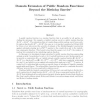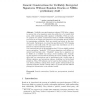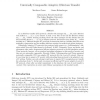783 search results - page 138 / 157 » On security proof of McCullagh |
CRYPTO
2007
Springer
14 years 2 months ago
2007
Springer
A public random function is a random function that is accessible by all parties, including the adversary. For example, a (public) random oracle is a public random function {0, 1}�...
SP
2006
IEEE
14 years 2 months ago
2006
IEEE
Inspired by unidirectional error detecting codes that are used in situations where only one kind of bit errors are possible (e.g., it is possible to change a bit “0” into a bi...
ACISP
2003
Springer
14 years 8 days ago
2003
Springer
In some practical circumstances, the ability of a signer should be restricted. In group signature schemes, a group member may be allowed to generate signatures up to a certain numb...
ACNS
2010
Springer
13 years 12 months ago
2010
Springer
Verifiably encrypted signature schemes (VES) allow a signer to encrypt his or her signature under the public key of a trusted third party, while maintaining public signature verifi...
ASIACRYPT
2008
Springer
13 years 10 months ago
2008
Springer
In an oblivious transfer (OT) protocol, a Sender with messages M1, . . . , MN and a Receiver with indices 1, . . . , k [1, N] interact in such a way that at the end the Receiver ...



